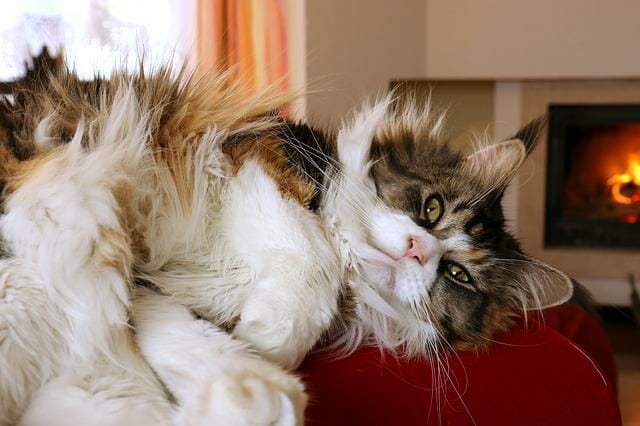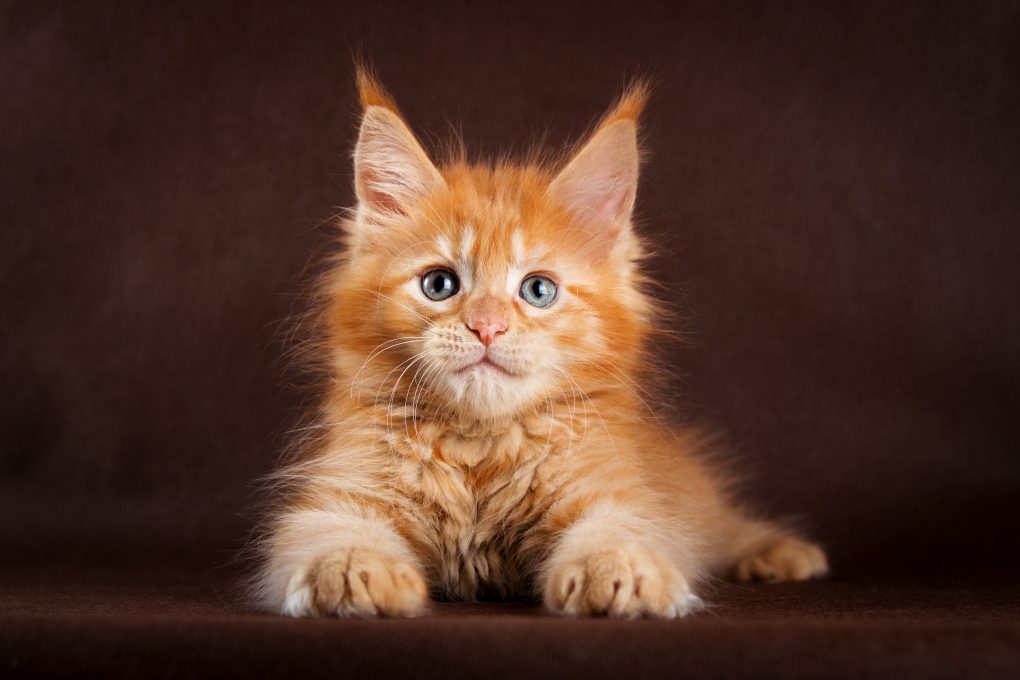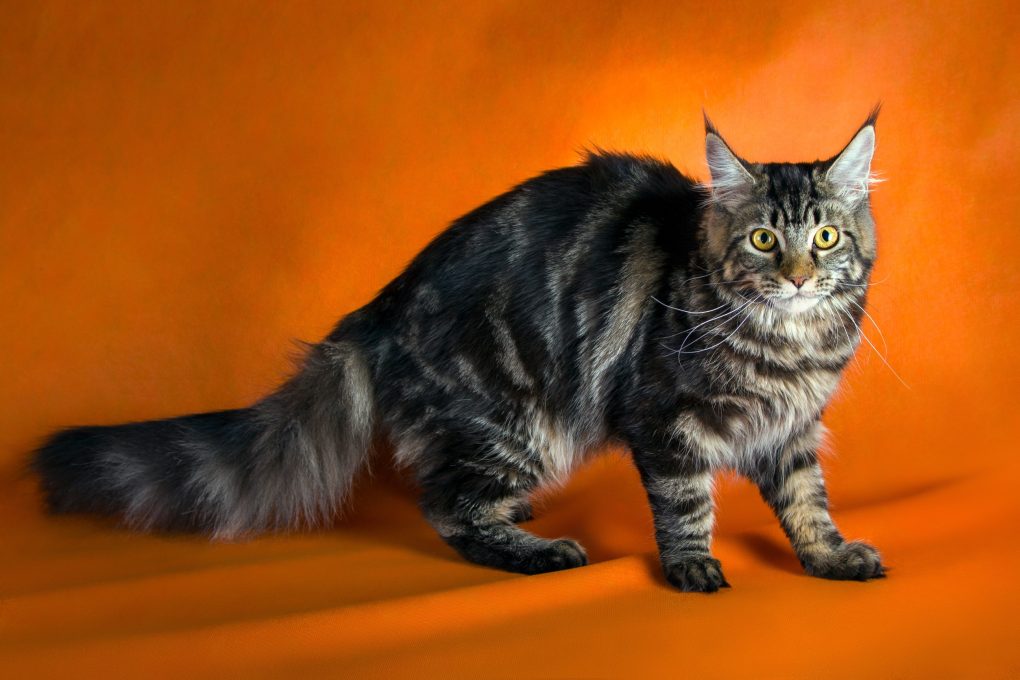How Long Do Maine Coon Cats Live: Factors Affecting Maine Coon Lifespan and Tips to Prolong It
Maine Coon cats have a relatively long lifespan compared to other cat breeds. On average, they live between 13-14 years, according to PetPlan, although some have been known to live into their late teens or even early 20s. The lifespan of a Maine Coon cat can be influenced by various factors such as genetics, diet, lifestyle, and veterinary care. By providing your Maine Coon cat with a healthy diet, you can help ensure they live a long and happy life.


Table of Contents
Factors That Influence the Lifespan of a Maine Coon
Genetic predisposition
Genetics plays a significant role in the lifespan of Maine Coon cats. Like all living beings, Maine Coons inherit genes from their parents that can influence their health and longevity. For example, genetic mutations or predispositions can increase the risk of certain health conditions or diseases that can shorten a cat’s lifespan.
Responsible breeding practices can also impact the lifespan of a Maine Coon. For example, breeding cats with a healthy genetic history and being screened for hereditary health issues can result in healthier kittens with a longer lifespan.
Diet
Diet can also play a significant role in the lifespan of a Maine Coon cat. Feeding your cat a balanced and healthy diet can help prevent obesity and reduce the risk of developing health problems such as diabetes, heart disease, and kidney disease, affecting your cat’s lifespan.
Providing your cat with a high-quality, species-appropriate diet rich in protein, vitamins, and minerals can help support their overall health and well-being and increase their chances of living a long and healthy life. Therefore, it’s important to consult your veterinarian to determine the best diet for your cat based on age, weight, and health needs.
Physical Activity and Mental Stimulation
Physical activity and mental stimulation can also play a role in the lifespan of a Maine Coon cat. Like all cats, Maine Coons need regular exercise and playtime to stay healthy and happy. Lack of physical activity can lead to obesity and other health problems that can shorten their lifespan. Providing your cat with toys, scratching posts, and other forms of stimulation can also help prevent boredom and promote mental well-being.
Keeping your cat mentally stimulated can help prevent behavioral problems that may lead to stress and anxiety, impacting its overall health and lifespan.
Lifestyle
The lifestyle you provide for your Maine Coon can also influence its lifespan. For example, a healthy lifestyle that includes regular veterinary checkups, proper nutrition, and good hygiene practices can help your cat live a long and healthy life.
Keeping your cat indoors can also help protect them from dangers such as traffic, predators, and exposure to disease, which can all harm its lifespan. Providing your cat with a safe, clean, and stimulating environment can also help promote its overall health and well-being and reduce the risk of injury or illness.
Environmental Factors
Environmental factors can also play a role in the lifespan of Maine Coon cats. For instance, exposure to toxins or pollutants can negatively impact a cat’s health and potentially reduce lifespan.
Environmental factors such as access to safe outdoor spaces, social interaction with other animals, and exposure to natural light can also affect a cat’s overall health and well-being. Providing a healthy and stimulating environment for your Maine Coon can help increase their lifespan and overall quality of life.
Healthcare
Regular healthcare and veterinary checkups also play a significant role in the lifespan of Maine Coon cats. Routine checkups and preventative care can help catch and address any health issues early on, leading to a longer and healthier life. Providing appropriate vaccines, parasite prevention, dental care, and maintaining a healthy weight can also help promote a longer lifespan for Maine Coon cats.
Health Issues That Affect Maine Coon’s Lifespan
Hip Dysplasia
Hip dysplasia is a hereditary condition that affects the hip joints of Maine Coon cats. It occurs when the ball and socket joint of the hip do not fit together correctly, leading to instability and wear and tear on the joint. This can result in pain, lameness, and arthritis, ultimately affecting the cat’s lifespan.
Maine Coon cats are particularly susceptible to hip dysplasia, and responsible breeders will test their cats for this condition and avoid breeding cats that carry the gene for it. However, even with careful breeding, hip dysplasia can still occur in some cats. So, it’s important to monitor your Maine Coon’s mobility and take them to the vet if you notice any discomfort or lameness.
Hypertrophic Cardiomyopathy (HCM)


Hypertrophic Cardiomyopathy (HCM) is a heart disease affecting humans and animals, including cats like Maine Coons. HCM is a genetic disease that causes the heart’s walls to thicken, making it difficult for the heart to pump blood efficiently. This thickening can also cause abnormalities in the heart’s electrical system, leading to irregular heartbeats and sudden death.
Maine Coons are one of the breeds prone to developing HCM, and it is estimated that around 30-40% of all Maine Coons may carry the gene for this condition. HCM can develop at any age, but it is most commonly seen in cats between one and five years old.
The symptoms of HCM can vary, and some cats may not show any signs of the disease until it has progressed to a more advanced stage. Common symptoms of HCM include difficulty breathing, rapid breathing, loss of appetite, lethargy, weakness, fainting or collapsing, and sudden death.
If you suspect that your Maine Coon may be suffering from HCM, it is essential to seek veterinary care as soon as possible. For example, a veterinarian can diagnose HCM through a physical examination, blood tests, and diagnostic imaging tests such as echocardiography. Treatment options for HCM may include medication to control symptoms and improve heart function, lifestyle modifications, and surgery or other interventions to correct heart abnormalities in severe cases.
Polycystic Kidney Disease (PKD)
Polycystic Kidney Disease (PKD) is a genetic condition affecting humans and cats, including Maine Coons. PKD causes cysts to form in the kidneys, which can eventually lead to kidney failure. This condition is caused by an inherited gene that causes the cysts to form, and it is estimated that around 40% of all Maine Coons may carry this gene.
PKD can develop at any age but is most commonly seen in cats between three and ten years old. The cysts can grow in size and number over time, leading to reduced kidney function and potentially leading to kidney failure.
Symptoms of PKD can vary, and some cats may not show any signs of the disease until it has progressed to a more advanced stage. Common symptoms of PKD in Maine Coons include: increased thirst and urination, loss of appetite, weight loss, vomiting, lethargy, incontinence, and poor coat condition.
If you suspect that your Maine Coon may be suffering from PKD, it is essential to seek veterinary care as soon as possible. For example, a veterinarian can diagnose PKD through a physical examination, blood tests, and diagnostic imaging tests such as ultrasound. Treatment options for PKD may include medication to control symptoms, dietary changes to support kidney function, and kidney transplant or dialysis in severe cases.
Spinal Muscular Atrophy (SMA)
Spinal Muscular Atrophy (SMA) is a genetic condition that affects the muscles in the spine and can cause weakness and loss of mobility. SMA is caused by a mutation in a specific gene responsible for producing a protein that supports the normal function of nerve cells that control muscle movement. Maine Coons, along with other breeds of cats, can be affected by this condition.
SMA can affect cats at any age, but it is usually seen in kittens under six months old. The severity of the symptoms can vary, and some cats may have only mild weakness, while others may experience severe muscle weakness and difficulty moving. Symptoms of SMA in Maine Coons include weakness in the limbs, difficulty walking or standing, muscle tremors, muscle wasting, difficulty breathing, loss of appetite, and lethargy.
Diagnosing SMA in Maine Coons usually involves a physical examination, blood tests, and genetic testing to confirm the presence of the gene mutation. Unfortunately, there is no cure for SMA, but supportive care can help manage the symptoms and improve the quality of life for affected cats. Treatment options may include:
- Physical therapy.
- Medication for pain and inflammation.
- Dietary supplements to support muscle function.
Tips to Help Your Maine Coon Live Longer


Provide a Nutritious Diet
It’s important to provide your Maine Coon with a healthy and balanced diet that contains the right balance of protein, carbohydrates, and fats. A portion of good cat food will contain a high percentage of protein, but it should also contain low levels of carbohydrates and fats. Unfortunately, too much of either of these can lead to obesity and health issues, so it’s important to ensure that you feed your cat the right food.
Additionally, avoid overfeeding your cat by providing it with only a small portion at a time. This will help prevent obesity and ensure that your Maine Coon cat is getting proper nutrition. Regular exercise is also essential for your cat’s long-term health, so play with it or take it for a walk regularly.
Exercise Regularly
Maine coon cats need daily physical exercise to ensure their physical health and lifespan potential. Regular playtime is essential for stimulating the cat mentally and physically. Providing your cat with new toys to keep them interested and engaged can help keep them occupied and active. Another way to exercise your cat is by walking them on a leash. Maine coon cats can be trained to walk on a leash, which allows you to enjoy the benefits of outdoor exercise while safely guiding your cat.
Maintain Oral Health
Maintain high-quality cat food to help ensure proper oral health for a Maine Coon. Change cat litter regularly to avoid the risk of cat urine and cat feces causing staining on the Maine Coon’s teeth. Regular exercise and play sessions can help keep Maine Coons fit and healthy and increase their lifespan.
Brush the Maine Coon’s teeth at least three times a week to reduce the risk of gingivitis and build a strong dental structure. By taking care of the oral health of your Maine coon, you can ensure that it continues to live a long and healthy life.
Provide Mental Stimulation
Maine coon cats require plenty of mental stimulation to remain healthy and happy. They love conversations, so routinely engaging in cat-to-cat chats is a good idea. Interactive cat toys will keep them entertained and working for a treat. Providing your cat with opportunities for physical activity, such as walking on a leash, can also keep them physically and mentally engaged. To help your cat live a long, healthy life, give them adequate attention.
Vaccinate Regularly
Vaccinations are a vital part of ensuring a cat’s health and lifespan. Maine Coon cats should be vaccinated regularly, starting when they are a cat with shots at around six months of age. However, it’s important to remember that cat vaccinations aren’t a one-time deal – cats require regular boosters to remain fully protected against the various diseases that can threaten their health. Maine Coon cats must also be taken to the vet for regular checkups and vaccinations as they age.
After ten years of age, it’s recommended that Maine Coon cats should be regularly checked by the vet to catch any potential health issues early. Long-time breed owners have reported many living up to 20 years of age and beyond, showing that cat vaccines and care make a difference in lifespan and health in cat breeds.
